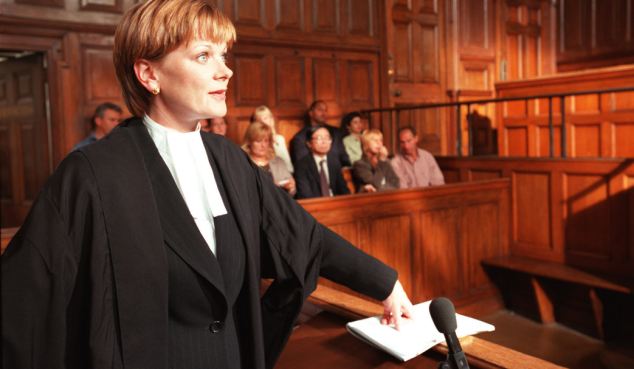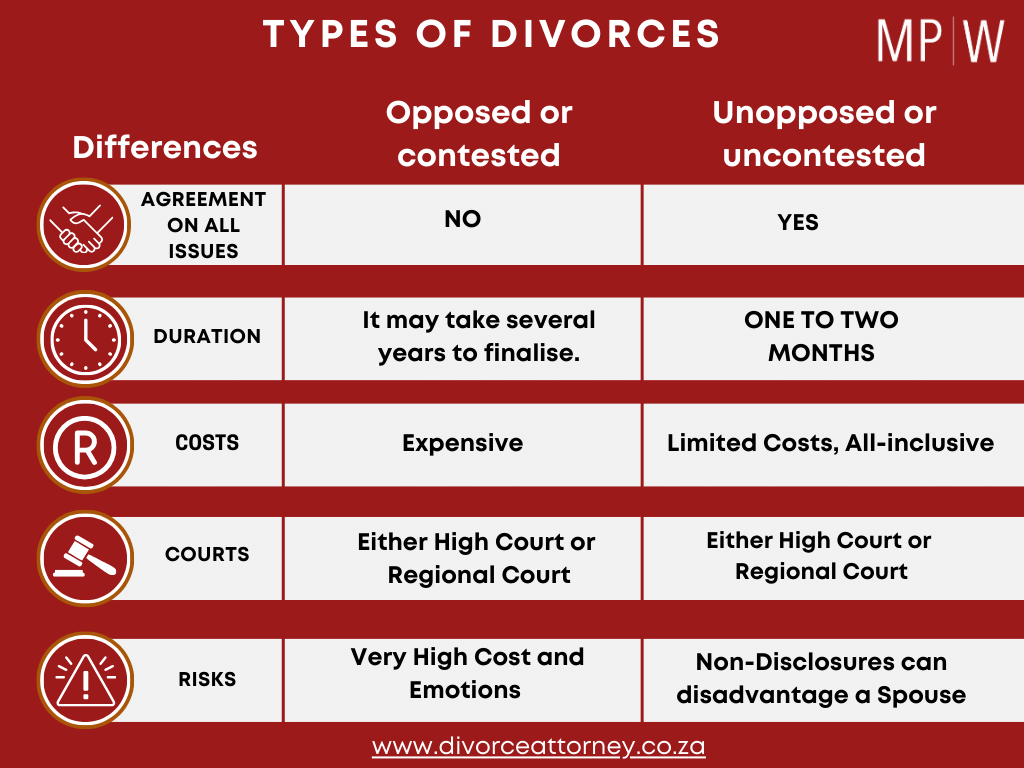Uncontested Divorce. What happens on the day in Court?
This article gives information about the court day procedure for an uncontested divorce, where handled by an attorney.
Your uncontested divorce papers have been signed, the documents have been served on the Defendant by the Sheriff, the Family Advocate has endorsed the parenting plan when there are children involved and the case is enrolled at court. Only the Plaintiff appears in court.
Consultation on the Divorce Day
If your divorce summons was issued in the High Court an Advocate will usually be appointed to appear with you in court. Usually at about 09:00 your attorney will accompany you to the advocate's office, called the Chambers. A short consultation will be conducted to explain the procedure and the questions that will be asked in court. After your consultation with the advocate your attorney will accompany you to court where you will meet the Advocate again. If your divorce is heard at the High Court, the court usually starts at 10:00. This does not mean that your divorce will be heard at 10:00 since there are usually a number of other cases on the court roll.
Advice:
The Dress Code for Court
Advocates will wear their black robes. Attorneys will usually wear corporate wear. There is no specified dress code for clients but if you are a woman stay away from revealing outfits.
The Actual Time of Your Divorce
The exact time that you will spend in the witness box in front of the Judge in the High Court is only a couple of minutes, but the waiting time can be something from a few minutes to even a couple of hours. Your attorney will understand that a day at Court can be quite stressful and tense for many, and that is why your attorney will never leave his/her client to wait alone.
The Questions the Advocate an Judge will ask you in Court
When your case is called, stand up and go to the witness box. Your advocate will then stand up and inform the Judge that he/she is appearing on your behalf. Thereafter you will take an oath or affirmation.
Now the Advocate will ask you questions that will include some of the following:
The Divorce Order
The Judge will then grant the Divorce Order (also referred to as a Divorce Decree if the papers are in order and if he/she is satisfied that there has been an irretrievable breakdown of the marriage. Once the Judge grants your divorce you are for all practical purposes divorced from that moment on divorced. Usually in about two weeks the Decree of Divorce will be available at the Court Registrar and your attorney will collect it and arrange that you get a copy of the decree.
Documents to Bring
In most cases the attorney will only ask that the client bring his/her original marriage certificate to Court. A marriage certificate is obtainable at the nearest Home Affairs Office if you don't have a copy. The process merely takes a few minutes, dependent upon on the extent of the queue. You will need your ID document and R20.00.
Conclusion
In conclusion, the above provides a comprehensive guide to the court day procedure for an uncontested divorce when represented by an attorney. It outlines the preparatory steps, including the signing of divorce papers, service of documents, and endorsement by the Family Advocate when children are involved. The article emphasises the importance of punctuality and appropriate attire, while also detailing the roles of the attorney and advocate in guiding the Plaintiff through the court process. It offers practical advice on what to expect in terms of timing, both in waiting and actual court appearance, as well as the types of questions that will be posed by the advocate and the judge. The article concludes by explaining the finalisation of the divorce through the granting of the Divorce Order and the subsequent availability of the Decree of Divorce. It also specifies the essential documents to bring to court, primarily the original marriage certificate. Overall, the article serves as a valuable resource for individuals navigating the legal intricacies of an uncontested divorce, aiming to demystify the process and alleviate some of the stress associated with a day in court.
Navigating the court day for an uncontested divorce in South Africa is a process marked by procedural precision and emotional gravity. The journey begins when the necessary documentation is in place — divorce papers signed, documents duly served, and parenting plans approved by the Family Advocate. This meticulous preparation underscores the importance of legal formality in ensuring that the process is as smooth and respectful as possible, both to the court and to the involved parties.
Upon the day of court proceedings, only the Plaintiff needs to be present. This aspect of the uncontested divorce is significant as it reflects the consensual nature of the proceedings; the absence of the Defendant speaks to the mutual agreement that underpins this type of divorce. The role of the attorney and, if applicable, the advocate, becomes crucial here. Their expertise and guidance are what anchor the Plaintiff, providing reassurance and clarity during what can be an emotionally taxing experience.
The pre-court consultation, usually held in the advocate’s Chambers, is a vital step in preparing the Plaintiff for the questions and procedures that will follow in court. This preparation is not only about ensuring that the Plaintiff understands what to expect but also serves as an emotional touchstone, allowing for any last-minute anxieties or questions to be addressed.
Once in court, the presence of the attorney alongside the client is a testament to the commitment of providing a supportive and professional service. As clients face the judge and adhere to the solemnity of the oath or affirmation, they are not alone — they have their legal representatives as both guides and support.
The questioning in court serves a dual purpose: it confirms the details of the marriage and the irretrievable breakdown leading to the divorce, and it also serves to reaffirm the jurisdiction and the appropriateness of the court's involvement. The involvement of children, their welfare, and the agreed-upon arrangements are handled with particular care, reflecting the system’s dedication to the best interests of the child.
The granting of the Divorce Order is the culmination of this process. The finality of the judge’s decree underscores the end of a marital relationship and the start of a new chapter in the lives of the individuals involved. The practical aspect of obtaining the Decree of Divorce from the court registrar symbolizes the final step in a process that is as much about legal endings as it is about personal beginnings.
Lastly, the advice on procedural necessities like the marriage certificate serves as a practical guide to ensuring that the day in court proceeds without any administrative hitches. It is a reminder that while the process is steeped in legal procedure, it is also grounded in the everyday realities of the individuals it serves.
In crafting a focused conclusion on uncontested divorces, it is vital to reiterate the efficiency, mutual respect, and emotional sensitivity that these proceedings embody. An uncontested divorce in South Africa is not merely a legal event; it is a carefully choreographed legal acknowledgment of the end of a marital union, where dignity is maintained, and closure is afforded within a system that respects the consensual decisions of the individuals it serves.
Your uncontested divorce papers have been signed, the documents have been served on the Defendant by the Sheriff, the Family Advocate has endorsed the parenting plan when there are children involved and the case is enrolled at court. Only the Plaintiff appears in court.
Consultation on the Divorce Day
If your divorce summons was issued in the High Court an Advocate will usually be appointed to appear with you in court. Usually at about 09:00 your attorney will accompany you to the advocate's office, called the Chambers. A short consultation will be conducted to explain the procedure and the questions that will be asked in court. After your consultation with the advocate your attorney will accompany you to court where you will meet the Advocate again. If your divorce is heard at the High Court, the court usually starts at 10:00. This does not mean that your divorce will be heard at 10:00 since there are usually a number of other cases on the court roll.
Advice:
- Don't be late!
- Do not bring your children to Court with you.
The Dress Code for Court
Advocates will wear their black robes. Attorneys will usually wear corporate wear. There is no specified dress code for clients but if you are a woman stay away from revealing outfits.
The Actual Time of Your Divorce
The exact time that you will spend in the witness box in front of the Judge in the High Court is only a couple of minutes, but the waiting time can be something from a few minutes to even a couple of hours. Your attorney will understand that a day at Court can be quite stressful and tense for many, and that is why your attorney will never leave his/her client to wait alone.
The Questions the Advocate an Judge will ask you in Court
When your case is called, stand up and go to the witness box. Your advocate will then stand up and inform the Judge that he/she is appearing on your behalf. Thereafter you will take an oath or affirmation.
Now the Advocate will ask you questions that will include some of the following:
- Whether you are the Plaintiff in the matter and whether the address stipulated in the Summons is your address.
- Is this place your permanent place of residence?
- To confirm the identity of the Defendant and his/her address as it appears in the Summons.
- The Advocate will then establish the jurisdiction of the court by confirming that your address falls withing the Court's jurisdiction.
- The Advocate will then ask when and where did you get married?
- The Advocate will then ask were you married in community of property, out of community of property, ex?
- You will be shown your marriage certificate and the Judge will ask you whether it is the original marriage certificate and whether the information thereon is correct.
- Do you and the Defendant still live together as husband and wife? (If you answer positive, provide the Court with the details of who will move out of the common home and when).
- To provide the Court with the reasons for the breakdown of the marriage.
- Are there any children born from the marriage? (If you answer positive state their names, ages and gender).The Judge will continue asking questions relating to parental rights and responsibilities, contact etc.
- If there is a settlement agreement, also referred to as a Consent Paper, it will be presented to you and you will be questioned if it is the original settlement agreement and if it is your and the Defendant’s signatures thereon.
The Divorce Order
The Judge will then grant the Divorce Order (also referred to as a Divorce Decree if the papers are in order and if he/she is satisfied that there has been an irretrievable breakdown of the marriage. Once the Judge grants your divorce you are for all practical purposes divorced from that moment on divorced. Usually in about two weeks the Decree of Divorce will be available at the Court Registrar and your attorney will collect it and arrange that you get a copy of the decree.
Documents to Bring
In most cases the attorney will only ask that the client bring his/her original marriage certificate to Court. A marriage certificate is obtainable at the nearest Home Affairs Office if you don't have a copy. The process merely takes a few minutes, dependent upon on the extent of the queue. You will need your ID document and R20.00.
Conclusion
In conclusion, the above provides a comprehensive guide to the court day procedure for an uncontested divorce when represented by an attorney. It outlines the preparatory steps, including the signing of divorce papers, service of documents, and endorsement by the Family Advocate when children are involved. The article emphasises the importance of punctuality and appropriate attire, while also detailing the roles of the attorney and advocate in guiding the Plaintiff through the court process. It offers practical advice on what to expect in terms of timing, both in waiting and actual court appearance, as well as the types of questions that will be posed by the advocate and the judge. The article concludes by explaining the finalisation of the divorce through the granting of the Divorce Order and the subsequent availability of the Decree of Divorce. It also specifies the essential documents to bring to court, primarily the original marriage certificate. Overall, the article serves as a valuable resource for individuals navigating the legal intricacies of an uncontested divorce, aiming to demystify the process and alleviate some of the stress associated with a day in court.
Navigating the court day for an uncontested divorce in South Africa is a process marked by procedural precision and emotional gravity. The journey begins when the necessary documentation is in place — divorce papers signed, documents duly served, and parenting plans approved by the Family Advocate. This meticulous preparation underscores the importance of legal formality in ensuring that the process is as smooth and respectful as possible, both to the court and to the involved parties.
Upon the day of court proceedings, only the Plaintiff needs to be present. This aspect of the uncontested divorce is significant as it reflects the consensual nature of the proceedings; the absence of the Defendant speaks to the mutual agreement that underpins this type of divorce. The role of the attorney and, if applicable, the advocate, becomes crucial here. Their expertise and guidance are what anchor the Plaintiff, providing reassurance and clarity during what can be an emotionally taxing experience.
The pre-court consultation, usually held in the advocate’s Chambers, is a vital step in preparing the Plaintiff for the questions and procedures that will follow in court. This preparation is not only about ensuring that the Plaintiff understands what to expect but also serves as an emotional touchstone, allowing for any last-minute anxieties or questions to be addressed.
Once in court, the presence of the attorney alongside the client is a testament to the commitment of providing a supportive and professional service. As clients face the judge and adhere to the solemnity of the oath or affirmation, they are not alone — they have their legal representatives as both guides and support.
The questioning in court serves a dual purpose: it confirms the details of the marriage and the irretrievable breakdown leading to the divorce, and it also serves to reaffirm the jurisdiction and the appropriateness of the court's involvement. The involvement of children, their welfare, and the agreed-upon arrangements are handled with particular care, reflecting the system’s dedication to the best interests of the child.
The granting of the Divorce Order is the culmination of this process. The finality of the judge’s decree underscores the end of a marital relationship and the start of a new chapter in the lives of the individuals involved. The practical aspect of obtaining the Decree of Divorce from the court registrar symbolizes the final step in a process that is as much about legal endings as it is about personal beginnings.
Lastly, the advice on procedural necessities like the marriage certificate serves as a practical guide to ensuring that the day in court proceeds without any administrative hitches. It is a reminder that while the process is steeped in legal procedure, it is also grounded in the everyday realities of the individuals it serves.
In crafting a focused conclusion on uncontested divorces, it is vital to reiterate the efficiency, mutual respect, and emotional sensitivity that these proceedings embody. An uncontested divorce in South Africa is not merely a legal event; it is a carefully choreographed legal acknowledgment of the end of a marital union, where dignity is maintained, and closure is afforded within a system that respects the consensual decisions of the individuals it serves.



